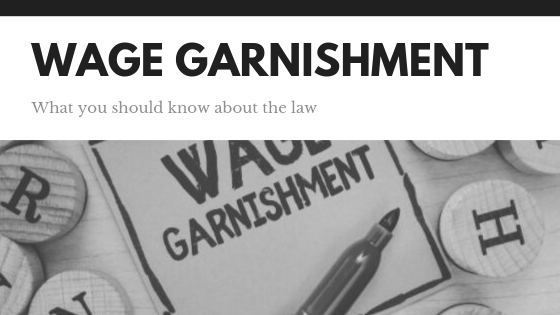Wage garnishments are one of those complex things that a company’s payroll may have to deal with if they have an employee that has a debt that is unpaid and put off. It is a challenging balancing act between Federal and State laws, that when done incorrectly could lead to some serious penalties on the employer’s side of things.
It’s an awkward situation for the company as it tangles HR into an employee’s jumbled personal finances. For this week we will be going in depth what every employer needs to know to begin to understand the complexities of wage garnishments and how they should be prepared to deal with the situation when it arises

Wage Garnishment 101
A wage garnishment, in its simplest of definition, is an order from a judicial or governmental agency requiring an employer to withhold a certain sum from the wages of an employee for payment of a debt. Common categories of wage garnishment are child support, tax levies, state and federal bankruptcy, and student and consumer loans according to data from ADP.
This, of course, exposes the company to legal vulnerabilities, as employees whose wages are being garnished have special legal protection at the state and federal level. Title III of the Consumer Credit Protection Act of 1968 (CCPA) restricts the number of earnings that may be garnished to 25% of disposable weekly income after mandatory deductions for taxes or the amount by which disposable earnings are greater than 30 times the minimum wage. This translates into that if a business deducts more than what is required, it opens the door to potential lawsuits and fines. Take out too little and the business could be subject to pay the entire debt of the employee plus penalties.
Know the law
It’s important to know the legal requirements of your business when handling wage garnishments. Some of the common mistakes that we see employers make are not keeping updated with changes to Federal and State requirements of wage garnishments. Know the legal requirements of your State as well as the Federal to stay ahead of the situation and avoid being blindsided by unexpected penalties. Given how technical this area can be, it helps to sit down with your business’s employment lawyer to review any changes to the law.
For example, on the federal level, child support and alimony are exceptions to the title III rule of the CCPA. Federal law states that up to 50% of an employee’s disposable earnings can be garnished for support payments if they are supporting another spouse or child, and it can go up to 60% if the employee is not. This can also increase an additional 5% for the arrears of child support to 55% and 65%.
Lump Sum requirements also change in every state, for example here in Texas Lump Sum Payments (Bonuses, Commissions, etc.) to those employees in arrears on child support could only see half of their earnings for that lump sum go to them and the other to the arrears. For this to take effect the lump sum payment would have to exceed $500 or more in order for the garnishment to take effect.
Some bankruptcy and tax court proceedings are also exempt from the title III rule, so the best practice is always to check with your lawyer to review any garnishment orders that exceed 25%.
Informing an employee of wage garnishment
When a garnishment order is given by the court it is up to HR to inform the employee of the matter. It can be an awkward conversation as it brings an employee’s personal problems into the workplace, but these conversations can be handled with finesse to ensure that both parties are satisfied with the situation.
When tackling this delicate conversation, it helps to be prepared with answers to any questions an employee might have about the garnishments. A good tip to help prepare an employee is having a copy of the court order to show them as well as explaining what the garnishment is for.
You also might encounter employees who need to vent during the conversation. It is helpful to be sympathetic during this time by lending a listing ear, but keep in mind that if you are asked questions about legal matters it’s best to advise them to speak to their lawyer.
If the question of if the employees’ job is in jeopardy arises, assure the employee that under Federal law: no employer may discharge an employee because his wages have been garnished or because of any one indebtedness. Doing so could open up the employer to a lawsuit by the employee, as well as fines up to $1,000.

Wage garnishment can be a tricky process, and when handled incorrectly can land a business in deep legal trouble. If you find that your business is unprepared to handle all of the legal paperwork that goes into garnishing an employee’s wages, don’t be afraid to seek out the help of companies that are more prepared to handle how garnishments should be processed. Remember, delays in garnishments can be costly to the business, employees, and in the case of child support, your employees’ children
Are the rules of wage garnishment boggling your mind? SolveHR takes the headache out of wage garnishments with our experts who are trained in the latest Federal and State laws. Contact us to find out more about how our transactional HR solutions can help solve your wage garnishment problems so you can focus on what’s important—growing your business!

